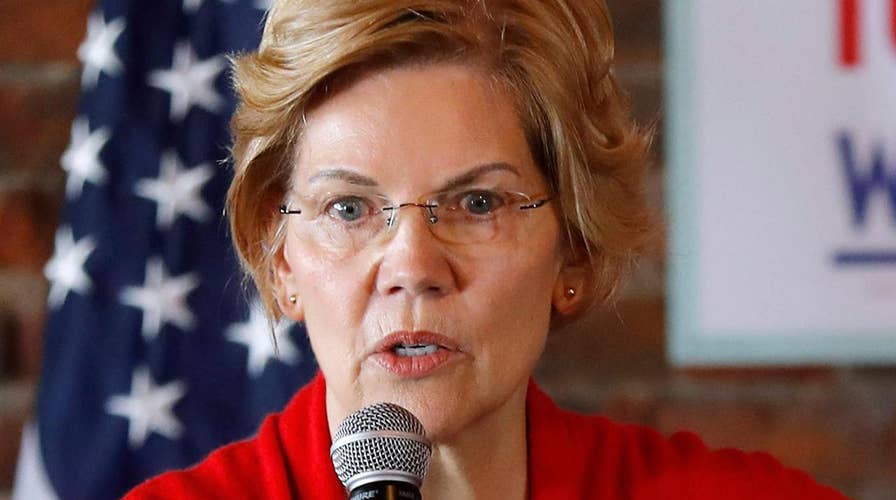Sen. Elizabeth Warren touts $1.25 trillion plan to forgive student loan debt, provide 'free' college
Can America afford the 2020 presidential hopeful's ambitious plan? King's College business and economics professor Brian Brenberg weighs in.
After a rocky opening act, the presidential aspirations of Senator Elizabeth Warren, D-Mass., have enjoyed a resurgence of late. First out of the gate as an official candidate with a surprise New Year’s Eve announcement, Warren failed to catch fire. But it seems being written off by pundits and eclipsed by her competitors did bring one advantage: it freed Warren from the searing scrutiny that accompanies any frontrunner.
For the better part of the past two years, Warren has been fending off allegations that her false claims to Native American status provided her an unfair professional advantage when she was applying to work at Ivy League institutions. While the issue still festers in the background, it has abated for now in the national conversation – largely because President Trump has shifted his ire to former Vice President Joe Biden.
For her part, Warren has used her newfound freedom to own the policy space, introducing a bevy of prescriptions for what she views as the ailments of the nation. Student loans, universal child care, affordable housing, the opioid crisis: you name an issue, Warren’s issued a white paper. Her staff has even started hawking t-shirts on her campaign web site reading, “Warren has a plan for that.” In a humanizing Twitter exchange that went viral, Warren even offered advice to a comedian who asked “Do you think Elizabeth Warren has a plan to fix my love life.”
Voters don’t always gravitate to the candidate with the most detailed policy ideas – just ask Jeb Bush. But as an author and former professor, Warren has always been in her comfort zone when talking policy.
Whatever the reason, fortune seems to have shifted in Warren’s favor. A new FOX News poll showed her support nationally has doubled since March. She consistently cracks the top five in early state polling data. And with the first Democratic debate in June, Warren, who went to college on a debate scholarship, will have another chance to shine in her natural arena.
Her momentum has led to new questions about whether the one-time frontrunner can climb all the way back. But maybe there is one person who might not be convinced Warren has a shot to become president…and that person is Elizabeth Warren.
Fresh off an easy re-election, Warren has a full five years before she faces voters again. She can spend the presidential primary season driving the debate to the left and making her endorsement, for whoever the ultimate nominee turns out to be, worth having.
Why? There’s no earthly way to fund all this new spending, and Warren is too intelligent a person to honestly believe otherwise.
According to an analysis from the Washington Free Beacon, Warren’s policy proposals clock in at an estimated $129 trillion dollars. That includes her support of big ticket items on the left’s wish list such as the Green New Deal and Medicare for all, as well as her own specific carve outs.
For context, our current national debt is just over $22 trillion dollars – Warren's proposals are more than five times higher.
Like other liberals who offer handouts (who wouldn’t want to go to college for free?), Warren advocates higher taxes to foot the bill. Warren has put forward a “wealth tax” and “real corporate profits tax” – neither of which would come anywhere close to covering her $129 trillion-dollar bill. Further, as a New York Times column observed, “there is an open debate around whether a wealth tax is constitutional.”
Offering esoteric and impractical policy ideas might be great for starting conversations in the hallways of Ivy League classrooms where Warren once roamed. But it’s not a workable governing philosophy.
As a senator, Warren has already experienced pie-in-the-sky ideas butting up against the realities of governing. Last week, her proposal targeting defense contractors has been undermined by her past support for the industry in her home state of Massachusetts, headquarters for the third largest defense contractor in the world.
CLICK HERE TO GET THE FOX NEWS APP
But Warren’s eyes are no longer on the priorities of the state she represents in the Senate. Fresh off an easy re-election, she has a full five years before she faces voters again. She can spend the presidential primary season driving the debate to the left and making her endorsement, for whoever the ultimate nominee turns out to be, worth having. Her own odds of making it to 1600 Pennsylvania Avenue are higher than a few months ago, but they’re still long.
That might be perfectly acceptable to her, since she won’t be on the hook for the pricey bill that makes up the centerpiece of her campaign.









































